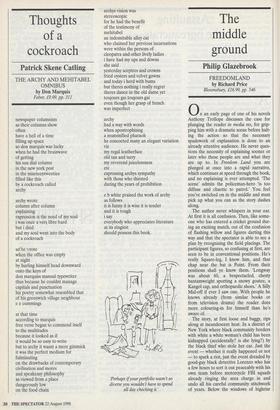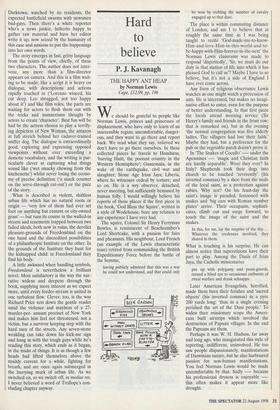The middle ground
Philip Glazebrook
FREEDOMLAND by Richard Price Bloomsbury, £16.99, pp. 546 0 n an early page of one of his novels Anthony Trollope discusses the case for plunging the reader in media res, for grip- ping him with a dramatic scene before halt- ing the action so that the necessary spadework of explanation is done to an already attentive audience. He never ques- tions the necessity of explaining sooner or later who these people are and what they are up to. In Freedom Land you are plunged at once into a rapid narrative, which continues at speed through the book, and no explaining is ever attempted. 'The scene' admits the policeman-hero 'is too diffuse and chaotic to patrol.' You feel you've switched on in the middle and must pick up what you can as the story dashes along.
The author never whispers in your ear. At first it is all confusion. Then, like some- one who has entered a cricket ground dur- ing an exciting match, out of the confusion of flashing willow and figures darting this way and that the spectator is able to see a plan by recognising the field placings. The participant figures, so confusing at first, are seen to be in conventional positions. He's really Square-leg, I know him, and that chap near the bat is Point. From their positions shall ye know them. longway was about 60, a bespectacled, chesty bantamweight sporting a snowy goatee, a Kangol cap, and orthopaedic shoes.' A Silly Mid-off if ever I saw one. With people he knows already (from similar books or from television drama) the reader does more colouring-in for himself than he's aware of.
The story, at first loose and baggy, rips along at incandescent heat. In a district of New York where black community borders with white a white woman's child has been kidnapped (accidentally? is she lying?) by the black thief who stole her car. Just the event — whether it really happened or not — to spark a riot, just the event dreaded by good-guy black detective Lorenzo who has a few hours to sort it out peaceably with his own team before motorcycle FBI squads already ringing the area charge in and undo all his careful community stitchwork of years. Below the windows of highrise Darktown, watched by its residents, the expected battlefield swarms with newsmen bad-guys. Then there's a white reporter who's a news junkie, hitherto happy to gather raw material and have her editor write it up, now seized by the humanity of this case and anxious to put the happenings into her own words.
The story emerges in fast, gritty language from the points of view, chiefly, of these two characters. The author does not inter- vene, any more than a film-director appears on camera. And this is a film wait- ing to be made; like a script it is heavy on dialogue, with descriptions and actions rapidly touched in (`Lorenzo winced, his cut deep. Leo shrugged, not too happy about it') and like film roles, the parts arc waiting for actors to flesh them out with the tricks and mannerisms thought by actors to create 'character'. Best fun will be had by the actress chosen to play a terrify- ing depiction of New Woman, the amazon at full stretch behind her cadaver-trained sniffer dog. The dialogue is extraordinarily good, exploring and expressing opposed viewpoints without ever exceeding a demotic vocabulary, and the writing is par- ticularly clever at capturing what things sound like (`wet smacky chewing from the kitchenette') whilst never losing the econo- my of precise definition Ca snack counter on the serve-through cut-out') or the pace of the story.
What is described is violent, shiftless urban life which has no natural roots or origin — 'very few of them had ever set foot on anything but cement or city-owned grass' — but runs its course in the walled-in streets and tenements trapped between two failed ideals, both now in ruins, the derelict pleasure-grounds of Freedomland on the one hand and the discredited possibilities of a philanthropic Institute on the other. In the grounds of the Institute they hunt for the kidnapped child: in Freedomland they find his body.
A little awkward when handling symbols, Freedomland is nevertheless a brilliant novel. Most satisfactory is the way the nar- rative widens and deepens through the book, supplying more interest as we expect more, until every feeder-stream is united in one turbulent flow. Clever, too, is the way Richard Price sets down the gentle reader amid the violence and mayhem of a 27- murder-per- annum precinct of New York and makes him feel not threatened, not a victim, but a survivor keeping step with the hard men of the streets. Any seven-stone weakling can take down his kick-me sign and hang in with the tough guys while he's reading this story, which ends as it began, in the midst of things. It is as though a few heads had lifted themselves above the muddy current for a while, fighting for breath, and are once again submerged in the hurrying murk of urban life. As we switched on, so we switch off, in medias res. I never believed a word of Trollope's con- cluding chapter anyway.

























































 Previous page
Previous page